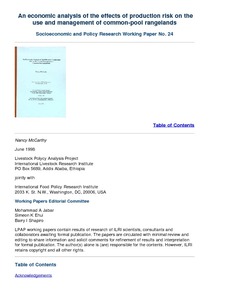Focal point
Location
About IFPRI
The International Food Policy Research Institute (IFPRI) provides research-based policy solutions to sustainably reduce poverty and end hunger and malnutrition in developing countries. Established in 1975, IFPRI currently has more than 500 employees working in over 50 countries. It is a research center of theCGIAR Consortium, a worldwide partnership engaged in agricultural research for development.
Vision and Mission
IFPRI’s vision is a world free of hunger and malnutrition. Its mission is to provide research-based policy solutions that sustainably reduce poverty and end hunger and malnutrition.
What We Do
Research at IFPRI focuses on six strategic areas:
- Ensuring Sustainable Food Production: IFPRI’s research analyzes options for policies, institutions, innovations, and technologies that can advance sustainable food production in a context of resource scarcity, threats to biodiversity, and climate change. READ MORE
- Promoting Healthy Food Systems: IFPRI examines how to improve diet quality and nutrition for the poor, focusing particularly on women and children, and works to create synergies among the three vital components of the food system: agriculture, health, and nutrition. READ MORE
- Improving Markets and Trade: IFPRI’s research focuses on strengthening markets and correcting market failures to enhance the benefits from market participation for small-scale farmers. READ MORE
- Transforming Agriculture: The aim of IFPRI’s research in this area is to improve development strategies to ensure broad-based rural growth and to accelerate the transformation from low-income, rural, agriculture-based economies to high-income, more urbanized, and industrial service-based ones. READ MORE
- Building Resilience: IFPRI’s research explores the causes and impacts of environmental, political, and economic shocks that can affect food security, nutrition, health, and well-being and evaluates interventions designed to enhance resilience at various levels. READ MORE
- Strengthening Institutions and Governance: IFPRI’s research on institutions centers on collective action in management of natural resources and farmer organizations. Its governance-focused research examines the political economy of agricultural policymaking, the degree of state capacity and political will required for achieving economic transformation, and the impacts of different governance arrangements.
Research on gender cuts across all six areas, because understanding the relationships between women and men can illuminate the pathway to sustainable and inclusive economic development.
IFPRI also leads two CGIAR Research Programs (CRPs): Policies, Institutions, and Markets (PIM) andAgriculture for Nutrition and Health (A4NH).
Beyond research, IFPRI’s work includes partnerships, communications, and capacity strengthening. The Institute collaborates with development implementers, public institutions, the private sector, farmers’ organizations, and other partners around the world.
Resources
Displaying 1376 - 1380 of 1521Are determinants of rural and urban food security and nutritional status different?
Undernutrition of children 0-60 months old in Mozambique is much higher in rural than in urban areas. Food security is about the same, although substantial regional differences exist. Given these outcomes, we hypothesized that the determinants of food security and nutritional status in rural and urban areas of Mozambique would differ as well. Yet we find that the determinants of food insecurity and malnutrition, and the magnitudes of their effects, are very nearly the same.
Working women in an urban setting
Data collected from a 1997 household survey carried out in Accra, Ghana, are used to look at the crucial role that women play as income earners and in securing access to food in urban areas. The high number of female-headed households and the large percent of working women in the sample provide a good backdrop for looking at how women earn and spend income differently than men in an urban area. Livelihood strategies for both men and women are predominantly labor based and dependent on social networks.
A general equilibrium analysis of alternative scenarios for food subsidy reform in Egypt
This paper uses a Computable General Equilibrium (CGE) model to simulate the short-run effects of alternative food- subsidy scenarios. Savings from reduced subsidy spending are used to reduce direct taxes uniformly for all household types. The model uses a 1996/97 database with detailed household information. The simulated impact of targeting or eliminating oil and sugar subsidies is small: disaggregated real household consumption changes by ±0.3 percent.
Past and future sources of growth for China
This study develops an analytical framework to account for sources of rapid economic growth in China. The traditional Solow approach includes only two sources, i.e. increased use of inputs and technical change. We expanded the approach to include a third source of economic growth-structural change. The empirical results show that structural change has contributed to growth significantly by reallocating resources from low productivity to high productivity sectors, especially by moving labor from agricultural production to rural enterprises.




